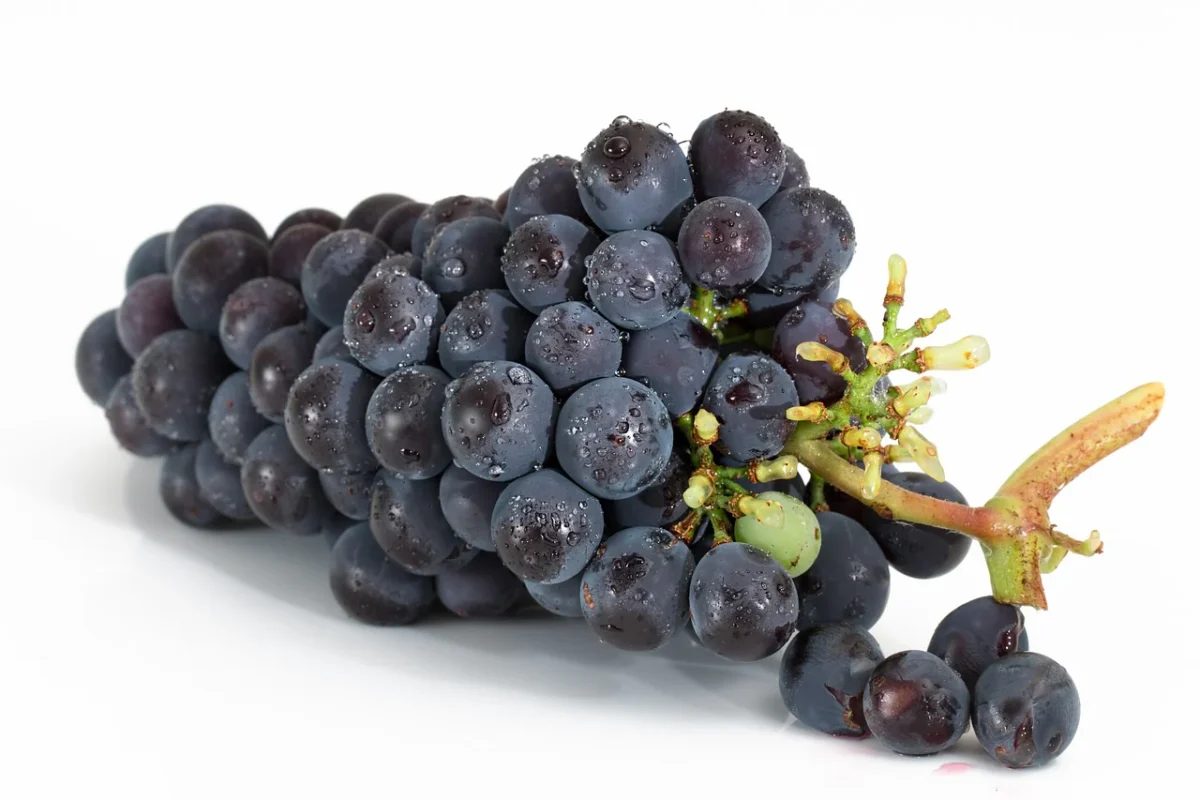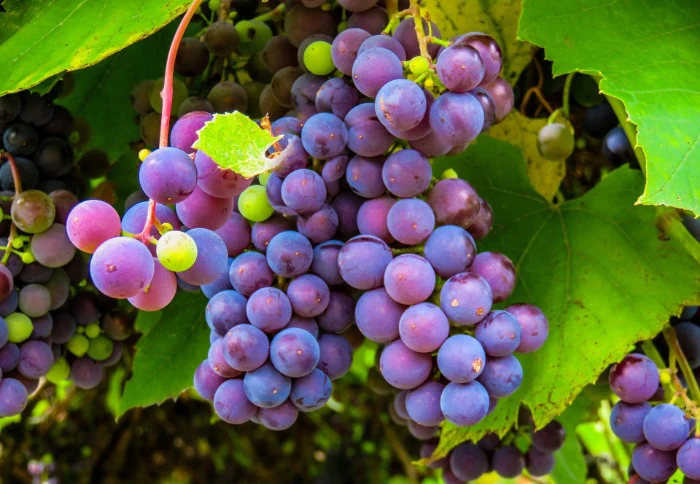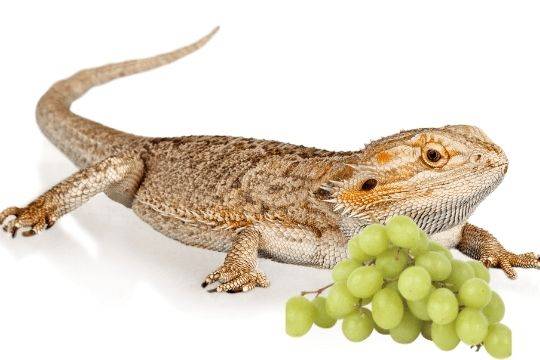Bearded dragons, those charming reptiles native to the arid regions of Australia, have become increasingly popular as pets due to their docile nature and relatively straightforward care requirements.
Yes, bearded dragons can eat grapes safely in small amounts. Red, green, or purple grapes are fine once a week, cut into tiny, seedless pieces to prevent choking and digestive issues.
This article dives deep into the nutritional benefits, potential risks, and best practices for feeding grapes to bearded dragons, drawing from reputable sources to provide a comprehensive guide for pet owners.
Grapes are a juicy, sweet fruit that can offer some nutritional benefits for bearded dragons when fed sparingly. According to data from the USDA and other nutritional sources, grapes contain the following key components per 100 grams:
- Water Content: Approximately 80–85% water, making grapes a hydrating treat.
- Sugar: Around 16 grams of sugar, which is high for bearded dragons.
- Fiber: About 0.9 grams, aiding digestion and preventing constipation.
- Calcium: Roughly 10–14 mg, which is low compared to phosphorus (20–25 mg).
- Antioxidants: Particularly in red and purple grapes, compounds like resveratrol help reduce inflammation and support overall health.
- Vitamins: Small amounts of vitamins C, E, and K, which contribute to immune health and other bodily functions.
These qualities make grapes an appealing treat, but their high sugar and water content, along with an unfavorable calcium-to-phosphorus ratio, mean they should not be a staple in a bearded dragon’s diet.

Grapes can provide several benefits when offered as an occasional treat:
- Hydration: Bearded dragons originate from dry environments and may not drink water directly from a bowl. The high water content in grapes can help keep them hydrated, especially if they are reluctant to drink otherwise. Misting grapes or soaking them in water before feeding can further enhance this benefit.
- Fiber for Digestion: The fiber in grapes promotes smooth digestion and can help prevent constipation, which is a common issue in bearded dragons.
- Antioxidants: Red and purple grapes contain higher levels of antioxidants, such as resveratrol, which may reduce inflammation and support heart health. These compounds can also help prevent allergies and bolster the immune system.
- Low Acidity: Unlike citrus fruits, which are too acidic for bearded dragons and can irritate their digestive system, grapes have relatively low acidity, making them gentler on the stomach.
- Enjoyable Treat: Bearded dragons often enjoy the sweet taste and soft texture of grapes, which can be used as a high-value treat to encourage eating or as part of physical enrichment activities, such as placing grape pieces on a lick mat.
Must Read: Can Bearded Dragons Eat Clover Flowers: A Complete Guide!
While grapes are safe in moderation, there are several risks to consider if they are fed too frequently or improperly:
- High Sugar Content: Grapes contain significantly more sugar than is ideal for bearded dragons—approximately 50% more sugar by weight than Coca-Cola. Regular consumption of high-sugar foods can lead to obesity, dental disease, and metabolic disorders like fatty liver disease.
- Unfavorable Calcium-to-Phosphorus Ratio: A healthy bearded dragon diet should have a calcium-to-phosphorus ratio of 1.5:1 to 2:1, especially for juveniles and breeding females. Grapes, however, have a ratio of about 1:2, meaning they contain more phosphorus than calcium. Excessive phosphorus can bind to calcium in the body, pulling it from the bones and leading to metabolic bone disease (MBD), a serious condition that causes brittle bones and other health issues.
- Oxalates: Grapes contain oxalates, compounds that bind to calcium and prevent its absorption. Over time, this can contribute to calcium deficiencies, further increasing the risk of MBD.
- Choking Hazard: Whole grapes, especially for baby or juvenile bearded dragons, can pose a choking risk. Grapes should always be cut into small pieces, no larger than the space between the dragon’s eyes, to ensure safe consumption.
- High Water Content: While hydration is beneficial, too much water from grapes can lead to diarrhea or digestive upset, as bearded dragons are adapted to a low-water environment.
- Pesticide Residue: Grapes from non-organic sources may carry pesticide residues, which can be toxic to bearded dragons. Always wash grapes thoroughly or opt for organic or home-grown varieties when possible.
To ensure grapes are a safe and beneficial treat for your bearded dragon, follow these preparation and feeding guidelines:
- Choose Seedless Grapes: Always select seedless grapes, as seeds can cause intestinal blockages, which can be life-threatening. Even “seedless” grapes may occasionally contain small seeds, so inspect and remove any before feeding.
- Wash Thoroughly: Rinse grapes under running water to remove any pesticide residues or contaminants. Organic grapes are preferable to minimize chemical exposure.
- Cut into Small Pieces: Slice grapes into quarters or smaller, ensuring pieces are no larger than the distance between your bearded dragon’s eyes. This reduces the risk of choking, especially for younger dragons.
- Feed in Moderation: Healthy bearded dragons can safely consume one to two grapes once a week. For dragons with health issues like obesity or diabetes, limit grapes to once a month and consult a veterinarian. Fruits should make up only 5–10% of a bearded dragon’s diet.
- Mix with Greens: To balance the high sugar content, mix grape pieces with nutrient-rich greens like collard greens, mustard greens, or kale. This encourages a more balanced diet and offsets the low calcium content of grapes.
- Room Temperature: Avoid feeding cold grapes directly from the refrigerator, as cold temperatures can upset a bearded dragon’s digestion. Let grapes sit at room temperature before offering them.
- Consider Grape Leaves: Grape leaves are a nutritious alternative to the fruit, offering higher levels of calcium and protein with lower phosphorus. Wash and chop the leaves finely before placing them in the food dish.

Bearded dragons require a varied diet to meet their nutritional needs, which change with age. Here’s a quick overview to put grapes in context:
- Juveniles (0–12 months): Their diet should consist of 70–80% insects (e.g., crickets, Dubia roaches) and 20–30% plant-based foods, with fruits like grapes limited to occasional treats due to their high sugar content.
- Adults (12 months and older): The diet shifts to 50–80% vegetables (e.g., collard greens, turnip greens, bell peppers) and 20–50% insects, with fruits remaining a small portion (5–10%).
- Calcium Supplementation: To counteract the low calcium content of grapes and other fruits, dust insects with calcium powder regularly and ensure proper UVB lighting to aid calcium absorption.
- Avoid Toxic Foods: Never feed bearded dragons avocados, citrus fruits, or wild-caught insects, as these can be toxic or contain harmful pesticides.
If you’re looking for other fruits to offer as treats, consider the following, which are safe for bearded dragons in moderation:
- Apples: Low in oxalates, but remove the peel and cut into small pieces.
- Blueberries: High in antioxidants, but feed sparingly due to sugar content.
- Mango: Nutritious and palatable, but high in sugar, so limit to occasional treats.
- Tomatoes: High in vitamin A and a good calcium-to-phosphorus ratio, but feed sparingly due to water content.
Always prepare fruits similarly to grapes—wash thoroughly, remove seeds, and cut into small pieces.
Grapes are safe but not the best everyday food for bearded dragons. They contain sugar and water, which can upset digestion if given often. Small, seedless pieces once in a while are fine as a special treat.
Wild grapes are risky because they may carry pesticides, mold, or toxins. It’s safer to avoid wild grapes and only feed clean, store-bought, seedless grapes in tiny amounts to your bearded dragon as an occasional snack.
Bearded dragons can eat grape leaves in small amounts, but they don’t offer many nutrients compared to staple greens. Safer daily greens are collard, mustard, or dandelion. Use grape leaves only as an occasional variety food.
You Should Know: Can Bearded Dragons Eat Millipedes – Vet-Approved Guide!
Bearded dragons don’t usually have allergies like humans, but some may react badly to grapes. Signs include runny stool, lack of appetite, or unusual behavior. If your dragon shows discomfort after eating grapes, stop feeding them immediately.
No, bearded dragons should not eat grape seeds. Seeds can cause choking or digestion problems. Always choose seedless grapes or carefully remove every seed before serving. Safe, seedless grape pieces are the only way to offer grapes.

Grape jelly is not safe for bearded dragons. It contains added sugar, preservatives, and sometimes artificial flavors that harm reptiles. Stick with fresh, washed, seedless grapes in tiny amounts. Avoid processed foods like jams, jellies, or juices.
Yes, bearded dragons can enjoy strawberries as an occasional treat. Offer small, washed pieces without the green tops. Because strawberries are sweet and watery, only serve them once in a while, not as a regular food.
Yes, bearded dragons can eat grapes with the skin, but always wash grapes first to remove pesticides or wax. Cut them into tiny pieces to prevent choking. Skin is safe, but the portion must stay small.
Yes, apples are safe for bearded dragons when peeled, cored, and cut into tiny pieces. Never feed seeds or skin, as they can be dangerous. Offer apple occasionally as a treat, not a daily food.
Yes, bearded dragons can eat green grapes, just like red or purple ones. All colors are safe in small, seedless pieces. Feed them rarely, as grapes are high in sugar and should never replace healthy greens.
Bearded dragons can eat tomatoes, but only very rarely and in small amounts. Tomatoes are acidic and may upset digestion if overfed. Use them as a tiny treat, not part of their regular food routine.
Yes, they can eat both, but only in small amounts. Grapes should be rare treats, while carrots can be given occasionally as part of a mixed salad. Neither should replace leafy greens, the healthiest staple.
No, grapes should never be fed every day. Excessive sugar and water intake can cause health problems. Grapes are only safe as a once-a-week treat in small, seedless pieces mixed with healthy greens.
Bearded dragons can safely enjoy grapes as an occasional treat, provided they are prepared correctly and fed in moderation. Their high water and fiber content can aid hydration and digestion, while antioxidants in red and purple grapes offer additional health benefits. However, the high sugar content, unfavorable calcium-to-phosphorus ratio, and presence of oxalates mean grapes should not be a regular part of a bearded dragon’s diet. By limiting grapes to one or two pieces once a week, cutting them into small, seedless portions, and balancing them with nutrient-rich greens and insects, you can ensure your bearded dragon stays healthy and happy. Always consult a veterinarian if you’re unsure about your pet’s dietary needs or notice any signs of distress, such as difficulty breathing or digestive issues. With proper care, grapes can be a delightful addition to your bearded dragon’s varied and balanced diet.
Bearded dragons can eat one or two grapes once a week. Cut them into small, seedless pieces. Too many grapes can cause health issues.
Yes, bearded dragons can eat grapes with skin if washed well to remove pesticides. Peel them for younger dragons to avoid choking or digestion problems.
Bearded dragons shouldn’t eat fruit daily. Offer small amounts of apples, mangoes, or berries a few times a week, mixed with veggies for balance.
Beardies shouldn’t eat avocados, citrus fruits, rhubarb, or wild insects. These are toxic or harmful. Avoid high-sugar or high-fat foods to keep them healthy.
Yes, bearded dragons can eat bananas, but only rarely. Slice them small and offer once a month, as bananas are high in sugar and phosphorus.
Yes, bearded dragons can eat cucumbers occasionally. Peel and chop them small. They’re hydrating but low in nutrients, so mix with greens for a balanced diet.
No, bearded dragons can’t eat cheese. Dairy is bad for their digestion and can make them sick. Stick to insects, veggies, and occasional safe fruits.
Avocado, rhubarb, fireflies, onions, and garlic are dangerous for bearded dragons. These foods can poison them, so always avoid feeding.
Yes, bearded dragons can eat cooked eggs sometimes. Serve small, plain pieces without seasoning. Offer rarely, never as daily food.
Juveniles eat insects daily with greens, while adults need more vegetables and fewer insects. Offer food once or twice daily.
